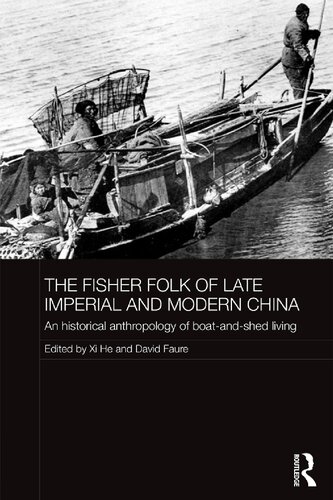

Most ebook files are in PDF format, so you can easily read them using various software such as Foxit Reader or directly on the Google Chrome browser.
Some ebook files are released by publishers in other formats such as .awz, .mobi, .epub, .fb2, etc. You may need to install specific software to read these formats on mobile/PC, such as Calibre.
Please read the tutorial at this link. https://ebooknice.com/page/post?id=faq
We offer FREE conversion to the popular formats you request; however, this may take some time. Therefore, right after payment, please email us, and we will try to provide the service as quickly as possible.
For some exceptional file formats or broken links (if any), please refrain from opening any disputes. Instead, email us first, and we will try to assist within a maximum of 6 hours.
EbookNice Team

Status:
Available0.0
0 reviews
ISBN 10: 1138924067
ISBN 13: 9781138924062
Author: Xi He, David Faure
Although most studies of rural society in China deal with land villages, in fact very substantial numbers of Chinese people lived by the sea, on the rivers and the lakes. In land villages, mostly given to farming, people lived in permanent houses, whereas on the margins of the waterways many people lived in boats and sheds, and developed their own marked features, often being viewed as pariahs by the rest of Chinese society. This book examines these boat and shed living people. It takes an "historical anthropological" approach, combining research in official records with investigations among surviving boat and shed living people, their oral traditions and their personal records. Besides outlining the special features of the boat and shed living people, the book considers why pressures over time drove many to move to land villages, and how boat and shed living people were gradually marginalised, often losing their fishing rights to those who claimed imperial connections. The book covers the subject from Ming and Qing times up to the present.
Introduction
Boat Living in Land-Based Society — He Xi and David Faure
Part One: As Seen from Historical Sources
Government Registration in the Fishing Industry in the Ming and the Qing — Yang Peina
Dispersal and Regrouping in Zhoushan Islands from the Ming to the Qing — Xie Shi
The Right to Fish on Poyang Lake as Seen in a Local Record — Liang Hongsheng
The Complexities of Property Rights at Diaocha Lake as Seen from Litigation — Zhang Xiaoye
Part Two: As Encountered in Field Research
5. Gods Adrift: Religious Ritual and Local Society on Naozhou Island — He Xi
6. Incense Associations among Small Boat Fishermen on Tai Lake — Xia Yihong
7. Some Examples of the Responsibilities and Succession of Incense Heads (Xiangtou) among the Fishermen of Tai Lake — Ota Izuru
8. From Respect for the Gods to Sacrifice to the Ancestors: Creating Lineage Culture among the Fishermen of Weishan Lake — Diao Tongju and She Kanglue
Part Three: As Contemporary Stereotypes
9. Land Supports Fishing People: The Fishermen of Dongting Lake from the 1930s to the 1950s — Wong Wing-ho
10. Going Beyond Pariah Status: The Boat Population of Fuzhou in the Chinese People’s Republic — Huang Xiangchun
11. From Sheds to Houses: A Dan Village in the Pearl River Delta in the Twentieth Century — Zeng Huijuan
12. The Recent History of the Fishing Households of the Nine Surnames: A Survey from the Counties of Jiande and Tonglu, Zhejiang Province — Sato Yoshifumi
the fisher folk of late imperial
the fisherfolk
the fisherfolk of jones island
the old fisherman poem
fishers folk
Tags: Xi He, David Faure, The Fisher Folk, Late Imperial, Modern China, An Historical